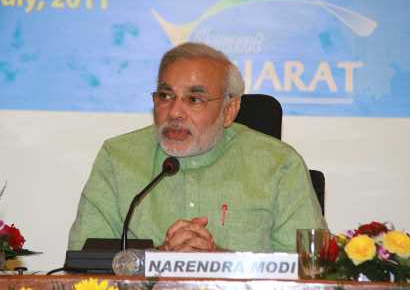
The Congress Party on Tuesday lashed out at Gujarat Chief Narendra Modi for passing derogatory comments on former Prime Minister Indira Gandhi.
Condemning Modi's remarks, Congress spokesperson Rashid Alvi said Indira Gandhi's integrity should always be maintained.
"It is highly unfortunate that if someone points fingers at Indira Gandhi. She was widely respected across the globe. If anyone has doubts over her credibility, then it is inappropriate," said Alvi.
Congress leader Prabha Thakur also echoed similar views, saying that Modi should introspect his role in Gujarat and refrain from communal politics.
"Narendra Modi should get rid of his communal spectacle and stop viewing everything in that perspective. He should not replicate this agenda as he has been doing in Gujarat, which in anyways is not possible," said Thakur.
"The people of this country are all loving and Indian society advocates peace. Therefore, such comments should not be made," she added
Narendra Modi had earlier spoken against former Indian Prime Minister Indira Gandhi, and said that she tried to dismember the northeastern states from the country for vote bank politics.
"Indira Gandhi had committed a big sin, I will just speak of one as she committed many of them. Known for her secular inclination, when she was contesting polls in northeast, the Congress Party mentioned in their manifesto that mentioned if they win, then they would bring in a rule synonymous to that in the Bible," said Modi.
"Can you imagine that if such is the stance while you are running the country then separatist forces would be at such a high advantage; back then no one questioned her secularism," he added
Modi further trained his guns on Nehru-Gandhi family by alleging that they have tried to distort history to their benefit and worked towards camouflaging the importance due to northeastern states
"Events related to patriotism should have found more exposure; and people should have been made aware of such inspirational personalities so that the young generation could draw immense motivation," he said.
"Some people laid down their lives for the country, many even spent their entire lives in jails of Andaman or were even executed. If these incidents come to light then what harm will it do to one particular family (Gandhis)? And, it is in this worry that the entire history is being deliberately distorted," he added.
Modi had also criticized Prime Minister Dr Manmohan Singh, saying he lacks both vision and gumption to run the country.The Congress Party on Tuesday lashed out at Gujarat Chief Narendra Modi for passing derogatory comments on former Prime Minister Indira Gandhi.
Condemning Modi's remarks, Congress spokesperson Rashid Alvi said Indira Gandhi's integrity should always be maintained.
"It is highly unfortunate that if someone points fingers at Indira Gandhi. She was widely respected across the globe. If anyone has doubts over her credibility, then it is inappropriate," said Alvi.
Congress leader Prabha Thakur also echoed similar views, saying that Modi should introspect his role in Gujarat and refrain from communal politics.
"Narendra Modi should get rid of his communal spectacle and stop viewing everything in that perspective. He should not replicate this agenda as he has been doing in Gujarat, which in anyways is not possible," said Thakur.
"The people of this country are all loving and Indian society advocates peace. Therefore, such comments should not be made," she added
Narendra Modi had earlier spoken against former Indian Prime Minister Indira Gandhi, and said that she tried to dismember the northeastern states from the country for vote bank politics.
"Indira Gandhi had committed a big sin, I will just speak of one as she committed many of them. Known for her secular inclination, when she was contesting polls in northeast, the Congress Party mentioned in their manifesto that mentioned if they win, then they would bring in a rule synonymous to that in the Bible," said Modi.
"Can you imagine that if such is the stance while you are running the country then separatist forces would be at such a high advantage; back then no one questioned her secularism," he added
Modi further trained his guns on Nehru-Gandhi family by alleging that they have tried to distort history to their benefit and worked towards camouflaging the importance due to northeastern states
"Events related to patriotism should have found more exposure; and people should have been made aware of such inspirational personalities so that the young generation could draw immense motivation," he said.
"Some people laid down their lives for the country, many even spent their entire lives in jails of Andaman or were even executed. If these incidents come to light then what harm will it do to one particular family (Gandhis)? And, it is in this worry that the entire history is being deliberately distorted," he added.
Modi had also criticized Prime Minister Dr Manmohan Singh, saying he lacks both vision and gumption to run the country.
 The Congress Party on Tuesday lashed out at Gujarat Chief Narendra Modi for passing derogatory comments on former Prime Minister Indira Gandhi.
The Congress Party on Tuesday lashed out at Gujarat Chief Narendra Modi for passing derogatory comments on former Prime Minister Indira Gandhi.